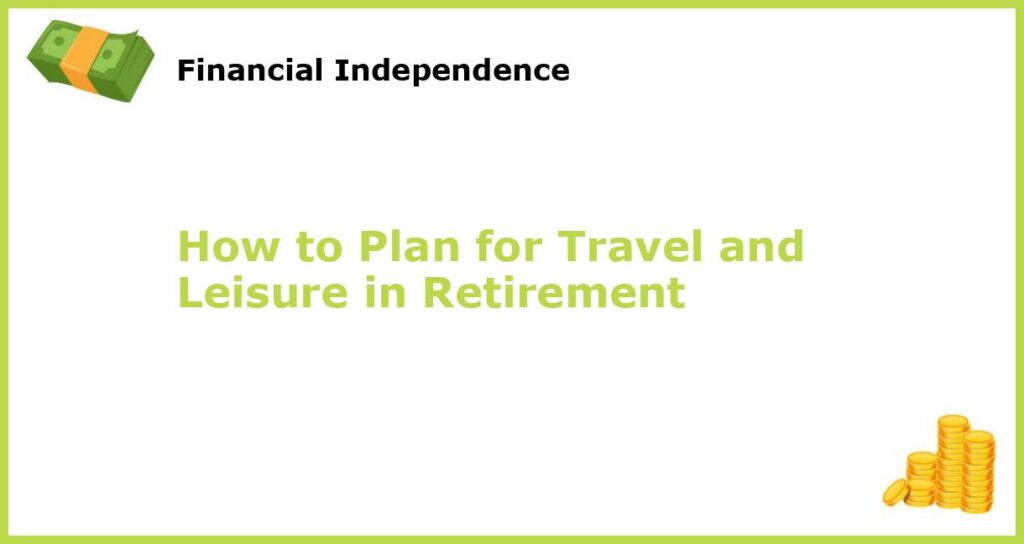If you’re nearing the end of your working years, no doubt retirement is a subject constantly on your mind. In addition to relaxing and taking life at a slower pace, many individuals plan to engage in various leisurely activities and travel more extensively. Here are ten tips on how to plan for travel and leisure in retirement.
1. Understand Your Retirement Goals

Planning for retirement is not a one-size-fits-all experience. Before you start planning your travel and leisure bucket list, it’s important to clearly define your specific retirement goals. Spend time deciding what kind of retiree you want to be. Do you want to spend your time traveling the world, exploring new cultures, and trying new things, or do you want to enjoy a more relaxed, leisurely retirement closer to home?
Once you have a good understanding of your retirement goals, you can start planning your next steps.
2. Determine Your Retirement Budget

Once you have defined your retirement goals, it is crucial to consider your budget. You may have big plans to travel extensively in retirement, but it’s important to make sure your budget allows for this. Consider your monthly expenses, including housing, food, transportation, healthcare, and all other expenses to determine how much money you can allocate to travel and leisure.
You will want to invest in a realistic budget that takes into account your retirement income and additional money that you may save for your activities.
3. Plan for Healthcare Needs

One of the essential considerations when planning for travel and leisure in retirement is healthcare. Always make sure to understand your Medicare benefits and additional out-of-pocket expenses you may incur during your trips. You should also consider purchasing travel insurance or a supplemental health insurance policy to ensure you’re covered while traveling.
With good health planning, you can enjoy all of your travel and leisure activities knowing that you have the medical support you need.
4. Research Travel Destinations

If you’re planning to travel extensively in retirement, it’s essential to research your destinations thoroughly. You need to consider factors that will affect your experience there, such as climate, cost of living, accessibility, and safety. Make sure you search for deals on flights and accommodations, and consider traveling during off-peak seasons to save money. Create a list of your desired destinations and start ticking them off one by one.
By researching your travel destinations, you will be adding more value to your retirement activities, by planning activities that you want to do in places you have never been before.
5. Plan Group Trips

Traveling with a group of friends or family members can be an excellent way to save money while still having new experiences. You should consider planning group trips with people with whom you share similar interests to destinations where you all want to visit. Traveling together also has the added benefit of being safer, a more meaningful experience and you might make some new lifelong friends.
You may find that group travel deals or discounts on flights and accommodations will make traveling together cost-effective as well.
6. Consider Alternative Accommodations

If you’re looking to reduce the cost of accommodations, consider alternative options such as house-sitting, camping, or staying in hostels or bed and breakfasts. These options can be more affordable than traditional hotels while providing a more authentic cultural experience. Plus, these alternative options will help you meet diversified people and create lasting friendships as well.
You may want to weigh your options before deciding, as each type of alternative option might cater to different elements of your personality or lifestyle.
7. Explore Leisure Activities Close to Home
If you’re looking to relax and have a more leisurely retirement experience closer to home, consider exploring various leisure activities nearby. Look for local parks, museums, and cultural events, or consider taking up a new hobby like painting, knitting, or gardening. Doing more activities closer to home will help you know your community and the people that support it.
By engaging in local events or hobbies, you may find that you become more grounded and relaxed in your community, which can have a myriad of other health benefits.
8. Plan Ahead for Seasonal Activities
If you’re planning on enjoying seasonal activities in retirement, such as skiing or hiking, careful planning is essential. Look for deals on equipment rentals or season passes and always make sure to check weather and trail conditions before heading out. Planning accordingly will help you stay safe and have a memorable experience.
By taking advantage of seasonal activities, you will connect with nature, meet new people with similar interests, and also improve your overall physical health.
9. Stay Active and Engaged
No matter what your retirement goals are, it’s important to stay active and engaged. This can help keep your mind and body healthy and can help you stay connected with friends and family. Consider volunteering, joining a local club or organization, or taking classes to learn new skills. These activities would give you something to look forward to and will be fulfilling and meaningful in their own unique way.
Remaining active and engaged is essential to maintaining your social life, your overall wellbeing, and your mental health.
10. Remain Flexible and Open to New Experiences
Finally, it’s important to remain flexible and open to new experiences as you plan for travel and leisure in retirement. You may come across unexpected opportunities or find that your interests change over time. By remaining open-minded and adaptable to new ideas, you can make the most of your retirement and enjoy a more fulfilling, satisfying life. This tip applies to all aspects of life, not just travel, and can be particularly important in the retirement phase.
Being open to new experiences can provide you with a newfound sense of purpose, new friends, new hobbies, and a more rewarding and meaningful retirement period.







